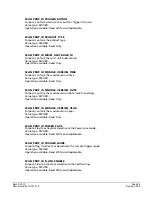
9.0
C
ORDLESS
S
CANNER
(CS)
S
PECIFICS
The Cordless Scanners integrate Socket barcode scanning capabilities into a cordless solution. The user
can now program the same functionality provided in our SDK through a
Bluetooth
connection. Along
with these changes new APIs are required to configure and manage the
Bluetooth
connection as well
as the scanner.
To provide CS functionality is straight-forward. A simple call to ScanEnableCHS() to load the driver and
the creation of a user defined message type to handle the connection status is all that is needed! The
following information on the relevant APIs and registry settings should provide the required details.
An example of its usage is also available in the sample code.
The CHS and CRS require that Connect!Agent be installed upon the target device. Connect!Agent
simplifies the process of discovering and connecting to CHS and CRS devices and allows ScanAPI to work
with a variety of different Bluetooth stacks.
Another feature of the Cordless Scanners is remote vs. local scanning options. When remote scanning
is selected all communication with the PDA is confirmed, hence you cannot trigger a scan until the PDA
acknowledges the scan request. Local scanning is a faster and more efficient scanning method; it does
not require all communication to be confirmed. Remote works best when the connection proves to be
unreliable or when distances are greater; whereas, local scanning is intended for short range scanning.
The CS MUST always receive a response from the application for the trigger button to be responsive. If
no response is sent back, the trigger button will resume operation after a 10 second lockout. In the case
where a user wishes to send a negative ACK back to the CS they can call ScanSendCmdtoCHS () with
payload of 0x06 (SET_INDICATORS_CMD) and command of 0x00 (None), which will result in no beep or
sound being generated.
For this mode of operation the following key must be added to the registry:
HKLM,"Software\Socket Communications\CHS\1.0", "
AutoSendGoodScanInd",0x00010001,
0x00
For more information, refer to registry setting details later in this chapter.
© Socket Communications, Inc.
November 16, 2004
Revision 2.18
















































